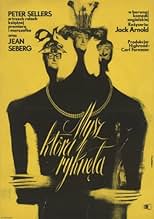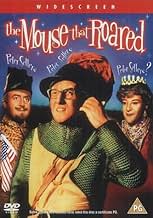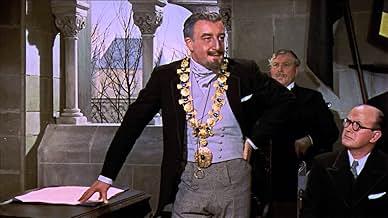A tiny, impoverished European nation declares war on the United States of America, planning to lose in order to collect post-war compensation, but things don't go according to plan.A tiny, impoverished European nation declares war on the United States of America, planning to lose in order to collect post-war compensation, but things don't go according to plan.A tiny, impoverished European nation declares war on the United States of America, planning to lose in order to collect post-war compensation, but things don't go according to plan.
- Director
- Writers
- Stars
- General Snippet
- (as Macdonald Parke)
- Cobbley
- (as Monty Landis)
- American General
- (uncredited)
- Fenwickian MP
- (uncredited)
- Air Raid Warden
- (uncredited)
- Ticket Collector
- (uncredited)
- British Ambassador
- (uncredited)
- French Ambassador
- (uncredited)
- Director
- Writers
- All cast & crew
- Production, box office & more at IMDbPro
Featured reviews
This is a funny and entertaining comedy with Peter Sellers as a real showman playing various characters . As Sellers acting as the scheming Prime Minister of Grand Fenwick, as the scheming Grand Duchess and as Tully Bascombe, commander of their medieval army . Sellers made this film in part as a means of emulating his intimate actor , Alec Guinness, by playing multiple roles in ¨Kind Hearts and Coronets¨ . Picture is a vehicle Peter Sellers , he's an authentic comic and real farceur . It's a pretty amusing farce with the master comic Sellers who displays efficiently his abilities. If you like Sellers's crazy interpretation ,you will most definitely enjoy this one . Colorful cinematography by John Wilcox , filmed in studios and on location as Marseilles and New York harbor sequences were filmed in Southampton, UK , the presence of the Queen Elizabeth ocean liner there was a lucky coincidence. The New York invasion sequence was filmed in Manhattan on a Sunday morning, accounting for the city's empty streets and good sets by production designer Geoffrey Drake . Atmospheric musical score by by Edwin Astley , among the musical quotations used in the film were excerpts from Felix Mendelssohn's "Hebrides Overture", "Rule Britannia", "A Life on the Ocean Waves", "Frankie and Johnnie", and a number of American marches . It is followed by a sequel ¨The mouse on the moon¨.
This well-edited motion picture is compellingly directed by Jack Arnold in his best foray into the comedy genre. He reigns supreme as one of the greatest filmmakers of 50s science , achieving an important cult popularity with classics as "The Creature from the Black Lagoon," and its follow-up titled "Revenge of the Creature" that was a nice sequel . "Tarantula" was likewise a lot of amusement and of course "The Incredible Shrinking Man" attained his greatest enduring cult popularity , it's a thought-provoking and impressive classic that's lost none of its power throughout the years . Arnold's final two genre entries were the interesting "Monster on the Campus" and the outlandish "The Space Children¨ . In addition to his film work, Arnold also directed episodes of such TV shows .
The story is about a miniscule European state, the duchy of Grand Fenwick, which sees a way out of bankruptcy by declaring war on the US (to be followed by a quick surrender, and rehabilitative aid from the generous victor). An invasion force, with 12th century chainmail and crossbows, is thereupon dispatched to New York. But by mistake, the commander captures the nuclear "Q-Bomb", along with its inventor and his beautiful daughter, and brings them back to Grand Fenwick.
Sellers plays three roles: Gloriana XII, the old reigning duchess (believe it or not); Baron Montjoy, the crafty prime minister; and Tully Bascomb, the inept army commander. For my money, the third role is the best. Absent any sort of disguise, except for a pair of glasses, Tully is the central character. The first scene of Grand Fenwick's part-time commander, and full-time gamekeeper, has him caught in a trap and unable to scare away the fox that just sits there looking at him. As the bumbling hero, he is funny in his own right, and we're all rooting for him to save the day at the end.
The one and only Sellers does a great job in all departments, the state of Grand Fenwick is expertly brought to the screen with a unique sense of humor, and this MOUSE still roars plenty loud even after forty some years. Four out of five stars.
Yet there is something very gentle and charming that moves this film along. I suppose that little something could very well be that the "bottom line" for the tiny country was world peace... Not a bad concept.
Worth watching.
Yes, that's Peter Sellers making what amounted to his debut as an over-the-title star, playing not one but three roles. First, he's Count Rupert Mountjoy, prime minister of the tiny nation of Grand Fenwick, who hatches the scheme of declaring war on the United States in order to quickly surrender and reap Marshall Plan-style aid. Then he's Tully Bascombe, the nearsighted leader of the Fenwick expeditionary force, who stumbles upon a weapon to force an American surrender. Finally, he's the Grand Duchess Gloriana, ruler of Grand Fenwick and very keen on war so long as no one gets hurt.
With that premise, and Sellers in the driver's seat, you expect more than "Mouse That Roared" delivers. Not that it's bad, or unentertaining. But after a rousing opening 20 minutes spent basking in Fenwick's goofy ambiance and establishing the daring plot, the film loses steam; first moving the action to an unconvincing Manhattan setting, then inserting a romantic subplot between Tully and an American girl (Jean Seberg) which features neither actor to good effect. The comedy is never sharp, but over time it becomes forced, recovering a bit only at the end.
It's a shame because the premise, as said, offers much, and director Jack Arnold, while no Kubrick, seems to appreciate both Sellers' gift for light comedy and the kind of film which suits that best. At times, especially with some inspired breaks from the action, "The Mouse That Roared" feels more like an Ealing comedy than the Ealing comedy Sellers actually made four years before, the far darker "Ladykillers."
"Mouse" has an edge to it, regarding the folly of mutually assured destruction and American hegemony, yet it manages to couch this very cleverly by emphasizing how essentially good the U.S. really is. You try selling the idea of a film showcasing a successful sneak attack against New York, in which the attackers are presented as the good guys. Yet "Mouse That Roared" was a monster hit, and for that Arnold and his team deserve credit.
"Only an imbecile could have won this war, and he did!" complains Mountjoy of Bascombe, seeing no good in holding America hostage with a football-shaped explosive device 100 times more powerful than an H-Bomb.
Sellers is distinctive if not a laugh magnet in his three roles, but the film suffers from poor supporting work around him. Except for Leo McKern, playing Mountjoy's scheming ally, no one distinguishes him- or herself around Sellers, and a couple of key performances are gratingly bad. The humor of the Fenwickians being mistaken as spacemen by Manhattanites is beaten to the ground, as is the "comedy" of Tully's gang peppering the QEII with arrows as it passes them on the ocean.
History favors the big battalions, but comedy loves the underdog. Here you are presented with a vehicle for an underdog who would prove every bit as worthy of our favor as Chaplin or Keaton, though it would take better films to make that point.
Did you know
- TriviaJack Arnold soon learned that Peter Sellers did his best work on the first take and was usually useless by take three. The actor, schooled in improvisation, couldn't keep the lines fresh if he had to say them over and over.
- GoofsAfter Grand Fenwick's army sets sail for home, the headline in one American newspaper (the San Francisco Review) references war mobilisation. American newspapers would spell it mobilization.
- Quotes
Grand Duchess Gloriana: How did the war go?
Tulley Bascombe: Well, Your Grace, we're home. Actually, there's been a slight change of plan. I know it will come as a surprise, a pleasant one, I hope, but we sort of won.
Prime Minster Count Rupert Mountjoy: You sort of WHAT?
- Crazy creditsThe Columbia Pictures logo in the beginning has the Torch Lady spot a mouse and run off.
The logo at the end of the film has the Lady return back to the logo.
- ConnectionsFeatured in L'univers du rire (1982)
- SoundtracksRomeo and Juliet Love Theme
(1868) (uncredited)
Written by Pyotr Ilyich Tchaikovsky
Played often in the score
Details
Box office
- Budget
- $450,000 (estimated)
- Runtime1 hour 23 minutes
- Aspect ratio
- 1.85 : 1
Contribute to this page
































